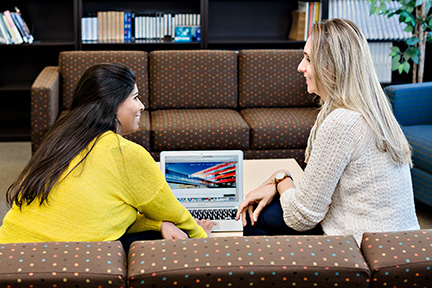
Sarah Cooper, Kim Hodge, and Christine Howell are anything but typical graduate students. In 2012, halfway through their master of nursing program, they took a leadership course called Transforming Nursing Practice, with Dr. Olive Yonge. The course ended up inspiring the students to create a peer-to-peer mentorship program in hopes of transforming the graduate student experience at the Faculty of Nursing.
"We talked a lot about mentorship and how we can engage people in nursing," says Cooper. "Many of our classmates said that we should really do this for ourselves."
That nugget stuck in her mind. As President-Elect of the Nursing Graduate Students' Association (NGSA), Cooper took the initiative to approach various faculty members over the summer for feedback, examined what roles might exist for a mentorship program, and what niches could be filled without duplicating any already existing services.
While Cooper transitioned into her new role during this time, the need for peer-to-peer mentorship became even more apparent. "I, and others in the NGSA, were getting asked a slew of questions by current and incoming graduate students. They weren't questions that could necessarily be answered by advisors or supervisors- they were cohort questions, questions that could be answered by like-minded individuals who had similar experiences," she says.
"As the conversations between me, Kim, and Christine evolved, it was clear that we wanted a sense of community among graduate students-and that was the primary interest in developing the program," she explains. "It's not that there was a lack of community, it was just a lot of disjointed communities. Developing a peer-to-peer mentorship program was a way to bridge all of these, and a way to get more people engaged."
Getting the ball rolling
In September 2013, Allison Norris joined the trio of graduate students, and MENTOR US was born. Within one month, the MENTOR US team put together a funding application for their proposed mentoring program. Although they didn't secure that specific funding, Yonge, their former instructor and now mentor, saw how engaged they were in bringing their idea to fruition sponsored the project through her Vargo Teaching Chair.
" People who are mentored learn twice as fast in half the time, thus in our fast paced world, mentorship is no longer optional. The founders and coordinators of MENTOR US are to be commended for their vision, organizational skills and generosity in improving the student experience for so many students." - Olive Yonge, professor
Funding in hand, the MENTOR US team immersed themselves in the development and implementation of the mentorship program. The team worked tirelessly to turn MENTOR US into a reality.
Cooper says with a laugh, "It was a rolling ball and we just had to hang on and ride it out." The four founding members divided the workload, and engaged current and incoming students in the development of MENTOR US- truly, a program made for students by students.
A snowball effect
MENTOR US launched in time for the Fall 2014 term and had 46 students sign up-more than 30 per cent of the Faculty of Nursing graduate student population.
"We had 23 matched pairs of a mentor and mentee and the feedback has been quite positive," explains Norris, who served as both director of MENTOR US and president of the NGSA for the 2014-2015 academic year.
The initial success of MENTOR US didn't surprise the team, but they are impressed by the number of students involved and are happy with experiences that the students have gained from this peer-to-peer mentorship. They think that the program holds a huge appeal to both mentors and mentees.
"Mentorship is endemic in everything now-it's used throughout academia and the healthcare sector," says Cooper, who believes that the program benefits both mentors and mentees equally. "We all need a sense of community; with MENTOR US, the same opportunities exist for both groups to meet, talk about our studies and problem solve."
The founding members are confident that MENTOR US will thrive in future years. "We're taking one step at a time and making sure that we do every step well," says Norris. "We're doing long-range planning to ensure that the program is set up to be sustainable in the years to come."
"We have to ensure that MENTOR US is needs based," says Cooper. "If students are coming up with and identifying a need, we have to stay true to whatever those needs are for them. That's the only way this program will survive and flourish."